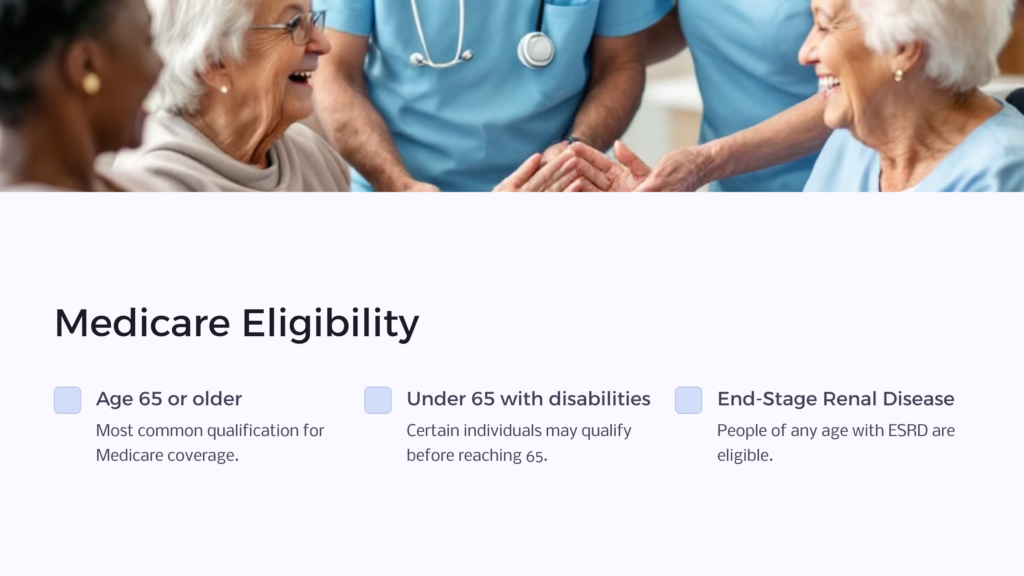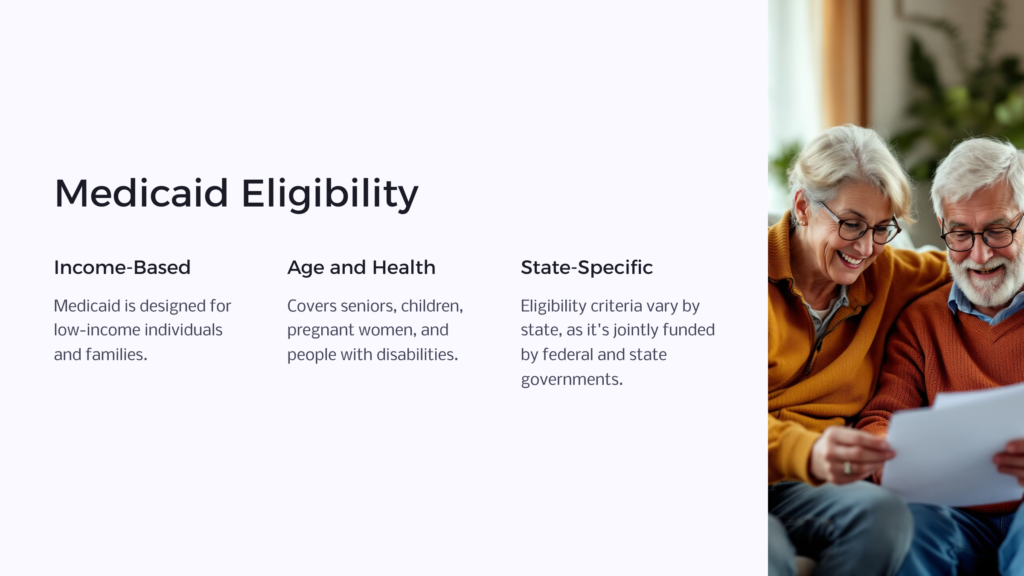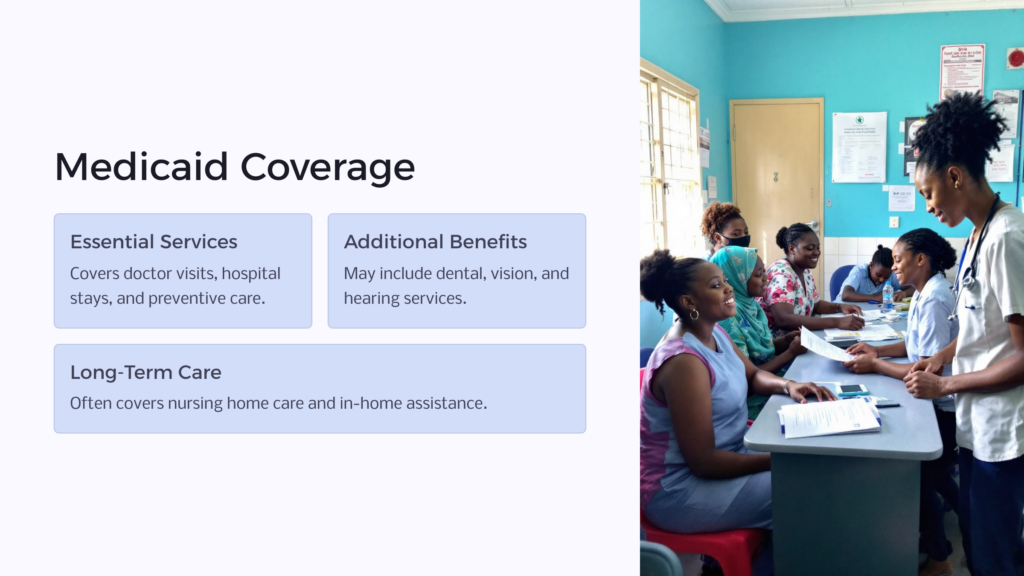Planning for your retirement involves careful consideration of several things – not least among them, making sure you have appropriate health care coverage. If you’re researching your retirement health care options, you may have questions about both Medicare and Medicaid. The two are often confused – both Medicare and Medicaid are government programs designed to help defray health care costs for Americans. But while they share that common goal, they also diverge in many ways, most notably in who qualifies for coverage and how.
How to Qualify for Medicare

Those who are eligible for the federally funded Medicare program typically meet the following criteria:
- People age 65 or older
- Certain people under 65 with disabilities
- People of any age with End-Stage Renal Disease (ESRD)
How to Qualify for Medicaid

Medicaid is funded jointly by the federal and state governments. You may qualify for Medicaid coverage if you meet some combination of the criteria below:
- Limited income
- Age 65 or older
- A child under 19
- Pregnant
- Living with a disability
- A parent or adult caring for a child
- An adult without dependent children (in certain states)
As you plan for your retirement, one of the largest expenses to consider is health care. If you meet certain qualifying criteria, Medicare and Medicaid can help defray health care costs – sometimes even before retirement and regardless of age.
It’s easy to get a bit confused about the differences between Medicare and Medicaid. After all, they have similar names and are both government programs. But while these government programs serve Americans by helping cover health care costs, they are run by different departments and are intended to serve different groups. You can think of Medicare as more of an insurance program and Medicaid as a public assistance program.
Who Qualifies for Medicare?
It’s often helpful to think of Medicare as a health insurance program designed for America’s seniors. Medicare is also available for younger Americans who live with qualifying disabilities.
Medicare is a federally funded program that provides health care coverage for Americans who are age 65 or older, or who live with a disability, no matter their age. Those with End-Stage Renal Disease, which is a state of permanent kidney failure that requires either frequent dialysis or a kidney transplant, also are eligible for Medicare, regardless of age. It’s also important to note that Medicare is not tied to income level.
The Medicare program launched in 1965. American workers pay taxes into the Medicare system with every paycheck they earn. These payments are taken out of your earnings, just like Social Security retirement taxes. If you’ve been employed and paid into the Medicare system, you’re automatically eligible for coverage as soon as you turn 65.
Original Medicare health care coverage has two chief components – Part A and Part B. Part A is known as hospital coverage and typically helps cover things like home health care, inpatient stays at hospitals, skilled nursing facility care, and hospice care. Part B, on the other hand, is known as health insurance, and it helps cover costs for things like preventive health care services, outpatient care, home health care, medical equipment like hospital beds, wheelchairs, etc., and services from physicians and other health care providers.
While there is no premium associated with Medicare Part A, most people pay a standard Medicare Part B premium. Medicare also offers a Medicare Advantage (Part C) and a prescription drug plan, known as Medicare Part D. Medicare is known for having gaps, so you shouldn’t necessarily plan for Medicare to be your only health insurance after you turn 65. Many seniors also have supplemental health insurance coverage, so as you plan, you’ll also need to factor in premiums for that kind of health coverage.
How to Qualify for Medicaid
Let’s take a deeper dive into how people qualify for Medicaid. Designed to serve America’s most vulnerable citizens, Medicaid’s eligibility criteria differ from those associated with Medicare, and, in fact, more closely resemble those associated with the federal Supplemental Security Income, or SSI.
Resident of State in Question
Each state has a different set of regulations regarding its program, including the application process and criteria for eligibility. You must be a permanent resident of the state in which you apply for Medicaid in order to be eligible for that state’s program. To qualify for Medicaid in any state, you must either be a U.S. citizen or be able to show proof of qualified immigration status.
Limited Income
Medicaid is designed as a public-assistance program supported by taxpayer dollars, so it’s reserved for helping low-income U.S. citizens. Medicaid is funded jointly by the state and federal government, so while it adheres to some federal guidelines, the program is administered differently in each state.
Before applying, make sure that you understand the income guidelines for your particular state. Income guidelines generally are based on the Federal Poverty Level, and your state may also consider any assets you hold as part of your income – things like stocks, bonds, CDs, and funds in a savings or checking account. The FPL is recalculated every year and takes into consideration factors like household size and cost of living for an area.
Age 65 or Older
Medicaid can often serve as a supplement to the federal Medicare program for lower-income people age 65 or over who can’t necessarily afford the premiums associated with Medicare’s coverage.
A Child Under 19
Children under age 19 are eligible for Medicaid benefits if they meet income eligibility criteria – typically this means that children who live in households earning less than 138% of the Federal Poverty Level qualify for benefits. This is true whether a child of this age is living with parents or is an older child living on her own.
Make sure to check out the criteria for your state – some state programs allow for Medicaid benefits for dependents up to age 21. Keep in mind that Medicaid was designed to provide benefits for the most vulnerable of children. Those who don’t qualify may also be eligible for benefits through a state’s Children’s Health Insurance Program, which casts a broader net and expands coverage for those who need assistance but don’t meet Medicaid’s criteria for eligibility.
A Parent or Adult Caring for a Child
If you are caring for a child under age 18 and can show financial need, you may also be eligible for Medicaid benefits, especially if the child is already receiving Medicare benefits.
If you care for a child with a chronic health condition that requires skilled nursing care, Medicaid may be able to help cover those expenses. In this type of case, you are considered a related caretaker—this includes being a parent or step-parent, a sibling, a grandparent, an uncle, aunt, a first cousin, niece, or nephew. Typically, to qualify for this type of benefit, you must show that the child lives with you full-time and is either age 17 or younger or 18 and attending school full-time.
Remember that guidelines vary from state to state, so make sure to research the qualifying criteria for your particular state.
Pregnant
If they meet income qualifications, pregnant women should apply for Medicaid assistance. This will ensure that both the mother and the child will be covered. In some cases, pregnant women who apply for benefits may qualify for full-scope Medicaid, depending on state requirements. Otherwise, any pregnant woman may qualify for Medicaid coverage associated with pregnancy-related services and any conditions that could complicate a pregnancy or make it dangerous.
Some states also have the option of offering pregnancy benefits through their Children’s Health Insurance Program. Most Medicaid support for pregnant women remains active through 60 days of postpartum care.
Medically Needy (Living With a Disability)
Even if your income exceeds the guidelines for your state, you may qualify for Medicaid benefits if you are considered medically needy. This typically means living with a chronic disability and incurring ongoing costly expenses. The Medically Needy pathway is designed to extend Medicaid benefits so that if your income is the only criteria you don’t meet, there’s still an option for financial assistance with long-term expensive medical care.
As of 2018, 34 U.S. states have this type of program in place. If your state offers this program, you can submit records of your income and medical expenses to determine whether your health care costs reduce income enough to qualify for your state’s program.
An Adult Without Dependent Children (in Certain States)
In some states, under provisions of the Affordable Care Act, Medicaid can provide benefits to adults under age 65 who have no dependent children or chronic disability. The rules vary from state to state, so make sure to research what is allowed in your state of residency.
What Does Medicaid Cover?

Medicaid services vary from state to state since the program is administered at the state level. But Medicaid services do have to meet certain federal standards for coverage. Medicaid often helps cover health care expenses associated with dental, vision and hearing services, doctor visits, transportation to and from medical appointments, laboratory and X-ray diagnostic services, preventative care, hospital stays, nursing home care, and other community and home-based services.
If you qualify for Medicaid in your home state, you automatically also qualify for assistance with paying for Medicare Part D, which includes prescription drug coverage.
Medicaid often covers custodial care, which allows for help with daily activities like bathing, eating, dressing, etc. This kind of care can be provided either in a skilled nursing facility or in-home. Plus, Medicaid often helps cover most of the costs associated with long-term nursing home care. This is a major departure from Medicare, which offers very limited coverage for nursing home care.
While all states are required to meet minimum federal standards, they also have the freedom to offer more services, and many do. Some states’ Medicaid programs also help cover costs for prescription drugs, physical and occupational therapy, chiropractic services, and more.
Can I Have Medicare and Medicaid at the Same Time?

Yes – those who qualify for both Medicare and Medicaid benefits at the same time are called “dual-eligibles.” Those who qualify for both programs are highly likely to have all or most of their health care costs completely covered. In this case, Medicaid typically covers all or most of any premiums associated with Medicare coverage for Medicare parts A and B, along with associated copayments and deductibles.
Medicaid will provide additional support for prescription drug coverage, even if you’re already enrolled in Medicare Part D – it’s also worth noting that Medicaid sometimes covers drugs that Medicare will not. If you are dual eligible, administrators of both programs will work together to ensure that they can save you the most money.
Medicare vs Medicaid
As you think about what your retirement health care coverage may look like, it’s helpful to understand the government programs that are available to assist you and potentially lower those costs. Although the two programs are very different, both Medicare and Medicaid can offer valuable help with your health care expenses.
Medicare is a federally funded health care insurance program designed to assist those age 65 or older, or with other qualifying health conditions. Medicaid, on the other hand, is a federal and state joint public assistance program designed to help low-income citizens, regardless of their age.
In some cases, the two programs work together to help lower costs as much as possible for those who qualify. Having a more in-depth knowledge of how the two programs complement one another can help you on your way to planning for a retirement in which all your health care needs are met.
 Benefits.com Advisors
Benefits.com Advisors
With expertise spanning local, state, and federal benefit programs, our team is dedicated to guiding individuals towards the perfect program tailored to their unique circumstances.
Rise to the top with Peak Benefits!
Join our Peak Benefits Newsletter for the latest news, resources, and offers on all things government benefits.


















